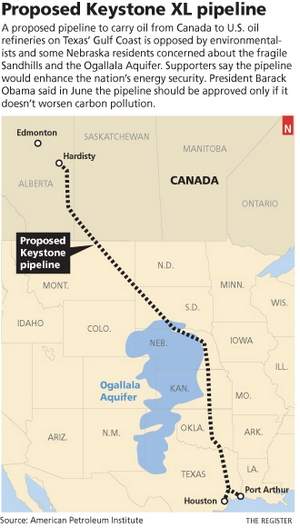 Midwest motorists will pay 20 cents to 40 cents more per gallon at the gasoline pump if the disputed Keystone XL pipeline is built, an activist group contends in a report released today.
Midwest motorists will pay 20 cents to 40 cents more per gallon at the gasoline pump if the disputed Keystone XL pipeline is built, an activist group contends in a report released today.
The new pipeline and existing lines would transport tar sands crude oil from Canada to Texas Gulf Coast refineries.
Consumer Watchdog, a California-based education and advocacy organization, maintains the true goal of multinational oil companies and Canadian politicians backing the pipeline is to reach export outlets outside the United States. That would deprive American drivers of benefiting from the Canadian oil, which is now discounted up to $30 a barrel, the report argues.
The report underscores a lively debate about the potential impact of the pipeline on gasoline prices.
An American oil industry spokesman immediately blasted the consumer group’s findings as “junk science.” In addition, U.S. Sen. Chuck Grassley, R-Ia., said the pump-prices argument has been disproved by many experts, including the Congressional Research Service and the U.S. Department of Energy.
Much of the opposition to the pipeline has come from environmentalists, who say oil extraction from tar sands will accelerate climate change.
But pipeline critics also say the pipeline would neither benefit consumers nor provide long-term benefit to the U.S. economy, based on industry data, public records and company documents.
“A vote for Keystone is a vote to raise gas prices on Americans and send the profits to a foreign oil company,” said San Francisco billionaire Thomas Steyer, a philanthropist and environmentalist who has endorsed the report.
The $7 billion Keystone XL pipeline would transport 800,000 barrels of Canadian oil from Alberta across six states to refineries along the Gulf. A southern section of the pipeline, from Cushing, Okla., to ports near Houston, already has been approved.
But the northern portion requires approval from President Barack Obama and the U.S. State Department because it crosses an international border. Obama said in June that he was instructing the State Department to approve the pipeline only if the project won’t increase net emissions of greenhouse gases, which contribute to global warming.
The Consumer Watchdog report said much of the Canadian oil would go directly to Gulf Coast refineries owned by the same multinational companies investing in Canadian tar sands. These companies include ExxonMobil, Chevron, Koch Industries, Marathon Oil and Shell Oil, the report said. The refineries would convert the tar sands crude into diesel, which is in high demand overseas, and gasoline for export.
“U.S. consumers should be wary of the Keystone XL pipeline — not just for substantial environmental and safety reasons, but because it threatens their wallets,” the report concludes.
John Felmy, chief economist for the American Petroleum Institute, said he finds it puzzling that gas prices would be driven up at the same time supply was increased. Basic economics holds that when supply increases, prices drop. The oil would be headed to the Gulf Coast to replace declining production of Mexican and Venezuelan crude oil, he said, adding that claims about exports in the report “are just silly.”
Grassley said in a statement he believes anti-oil and anti-pipeline advocates will tap any rhetoric possible to try to stop the project. He believes the pipeline would compensate for insufficient domestic oil supplies and reduce America’s dependence on less reliable foreign sources.
“The way I see it, the energy and economic development benefits of this pipeline are too important to delay any longer,” Grassley said.
Tim Albrecht, Gov. Terry Branstad’s communications director, issued a statement Monday in support of the pipeline.
“This pipeline is a part of the all-of-the-above energy approach this nation needs in order to secure energy security and independence. Anyone can cook up a report that says anything they want, but nobody should stand in the way of the thousands of jobs and billions in investment that this project will bring to the American families who deserve and need it,” Albrecht said.
Patrick DeHaan, a senior petroleum analyst for Gasbuddy.com, said he has long suspected that refineries may reap bigger profits if the pipeline is built. But he isn’t sure whether access to cheaper Canadian crude oil will lead to more exports and higher domestic prices.
“It just depends upon what the U.S. motorists consume,” DeHaan said. “If demand is here in the United States, they will probably keep product here. If demand is weak here, it gives them an avenue to export additional fuel.”
Phil Verleger, who heads a Colorado consulting firm that specializes in oil market economics, said two trends should keep oil prices down.
First, refineries in Chicago have been rebuilt to process the heavy Canadian crude. These companies have “market power” to squeeze the Canadians, and they undoubtedly will, Verleger said. Second, the Canadians assume the Gulf Coast refiners will push out Saudi, Mexican and Venezuelan heavy crudes, Verleger said.
However, the Saudis, Mexicans and Venezuelans own many of the Gulf coast units and have no reason to pay more for Canadian oil unless they can get better prices on world markets for their oil, he added.
“These countries — not the Canadians — hold the high cards,” Verleger said.




